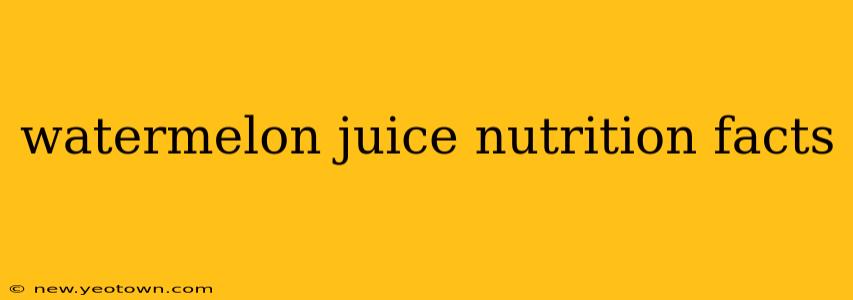Summer days often call for a cool, refreshing beverage, and watermelon juice perfectly fits the bill. But beyond its delicious taste, this vibrant pink juice offers a surprising array of nutritional benefits. Let's dive into the world of watermelon juice, exploring its nutritional profile and answering some common questions.
Imagine this: It’s a scorching summer afternoon. The sun beats down, and you’re parched. You reach for a tall glass of chilled watermelon juice, the sweet, cool liquid instantly quenching your thirst. That’s the simple pleasure of watermelon juice, but the benefits go far beyond simple refreshment.
What are the nutritional benefits of watermelon juice?
Watermelon juice is surprisingly nutrient-rich. It's a good source of vitamins, minerals, and antioxidants. A single serving provides a significant amount of Vitamin C, a powerful antioxidant that supports the immune system and protects cells from damage. It also contains Vitamin A, crucial for vision health and cell growth, and several B vitamins, which play vital roles in energy production and metabolism. Additionally, watermelon juice is a source of potassium, an essential electrolyte that helps regulate fluid balance and blood pressure.
The vibrant red color of watermelon juice comes from lycopene, a powerful antioxidant linked to numerous health benefits, including reduced risk of heart disease and certain cancers. This is a key reason why watermelon juice is considered a superfood.
Is watermelon juice good for weight loss?
This is a question many people ask. Watermelon, and therefore its juice, is relatively low in calories and high in water content, which can contribute to feelings of fullness. This can aid in weight management when incorporated into a balanced diet and exercise regime. However, it's crucial to remember that no single food or drink guarantees weight loss. A holistic approach to weight loss, including a healthy diet and regular physical activity, is essential.
Is watermelon juice good for your skin?
The antioxidants in watermelon juice, particularly lycopene and Vitamin C, contribute to healthy skin. These antioxidants help protect the skin from damage caused by free radicals, which can lead to premature aging and wrinkles. The high water content also helps keep skin hydrated, contributing to a healthy, radiant complexion.
What are the potential drawbacks of drinking watermelon juice?
While generally safe, excessive consumption of watermelon juice can lead to certain drawbacks. Its high sugar content might affect blood sugar levels, particularly for individuals with diabetes. Also, those with kidney problems should consume it in moderation due to its potassium content. It's always advisable to consult a doctor or registered dietitian before making significant changes to your diet, especially if you have pre-existing health conditions.
How many calories are in a glass of watermelon juice?
The calorie count in a glass of watermelon juice can vary depending on the serving size and whether it's 100% juice or diluted. Generally, a serving (around 8 ounces) contains relatively few calories, typically under 100. However, added sugars can significantly increase the calorie count. Always check the nutrition label for specific information.
How to make watermelon juice at home?
Making watermelon juice at home is simple and allows you to control the sweetness and ingredients. Simply blend cubed watermelon until smooth, then strain if you prefer a seed-free juice. You can add a splash of lime or mint for extra flavor. Avoid adding excessive sugar; the natural sweetness of the watermelon is usually sufficient.
In conclusion, watermelon juice offers a delightful and nutritious way to stay hydrated and enjoy the health benefits of this summer favorite. While it's not a magic bullet for weight loss or a cure-all, its rich vitamin, mineral, and antioxidant profile makes it a valuable addition to a healthy, balanced diet. Remember to consume it in moderation and consult a healthcare professional if you have any concerns.

